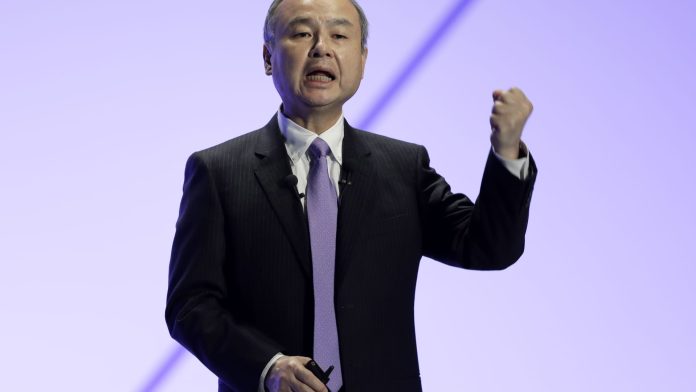[ad_1]
Masayoshi Son, chairman and chief executive officer of SoftBank Group Corp.
Kiyoshi Ota | Bloomberg | Getty Images
SoftBank shocked markets with a surprise loss in the first quarter covering April-June — but the Japanese tech conglomerate posted a rare investment gain at its massive tech-focused Vision Fund.
Here’s how the company did:
- The SoftBank group reported a net loss attributable to owners of the parent of 477.6 billion yen ($3.3 billion). This came in well below a Refinitv analyst estimate anticipating a 75 billion yen profit, but was much softer than the steep 3.16 trillion yen loss that the company logged in the same period of last year.
- SoftBank’s Vision Fund, which is closely watched by investors as an indicator of health in the tech sector, booked an investment gain of 159.8 billion yen ($1.1 billion), its first gain in five consecutive quarters. It benefited from investments in shares of the company’s subsidiaries, including chip design giant Arm.
The results mark something of a turnaround for Japanese tech guru Masayoshi Son’s beleaguered Vision Fund, which has over the last year or so racked up billions of losses owing to tech bets that soured in a high interest rate environment.
SoftBank’s CFO Yoshimitsu Goto said during the earnings call that the company has been carefully returning to making investments after previously cutting back on such activity due to grim market conditions.
Goto noted that both public and private market securities have seen a recovery over the past few months, with the Nasdaq Composite and Thomson Reuters Venture Capital Index both up considerably since the start of the year.
“Based on this trend we also like to make a good balance between gas and brakes for resuming investment activities,” Goto said.
The company, which has been trimming down its stake in Alibaba as it tries to recoup losses from last year’s meltdown in technology shares, said it saw an unrealized valuation loss on Alibaba shares of 553.4 billion yen. However, this was offset by a derivative gain of 769.9 billion yen.
Last fiscal year, SoftBank recorded a $32 billion loss at its Vision Fund investment arm, which has backed some of the largest names in technology today from Uber to South Korean e-commerce titan Coupang.
The company at the time said that, despite having exited its remaining stake in Uber, it still logged losses from investments such as SenseTime, a Chinese artificial intelligence company, and GoTo, an Indonesian ride-hailing and e-commerce firm.
The tech conglomerate, which engages in venture capital investing through its Vision Fund, has had its fair share of ups and downs. It halted new investments and offloaded its holdings of ride-hailing giant Uber, and trimmed its stake in Alibaba.
The brainchild of founder Masayoshi Son, SoftBank’s Vision Fund comprises Vision Fund 1 and Vision Fund 2 and invests in high growth stocks. Both portfolios have faced headwinds from rising interest rates globally causing investors to sell out of riskier equities such as tech.
Investors had been looking for clues on how SoftBank has benefited from the rise in technology stocks these past few months. Major technology names such as Alphabet and Amazon have seen their share prices climb since the start of the year, as investors bet on an end to a relentless rise in interest rates.
Also in focus was whether SoftBank stood to benefit from swelling demand for artificial intelligence following the rise of ChatGPT, a popular AI chatbot owned by Silicon Valley startup OpenAI.
SoftBank has previously shied away from making new investments amid a grim market environment. But the company has made no secret of its desire to capitalize on the “AI revolution.”
“We are carefully and slowly emerging back to investment activity,” Goto said Tuesday. “The investments that we have done so far has been selectively considered, and at the same time, keeping focusing on the AI trend.”
‘Offense mode’ in action
In a shareholder meeting in June, CEO Masayoshi Son said that SoftBank plans to shift from “defense mode” to “offense mode” as the firm has loaded up on cash by divesting some of its shareholdings in tech companies.
On Thursday, SoftBank’s chief financial officer hailed the return of the company’s activity in the market, noting that SoftBank had executed about $1.8 billion worth of investments between April to June.
“Last year, the whole year was almost stopped in terms of investing. So when you look at the three-year trend, we’ve been carefully restarting our investment activities,” Goto said, stressing that the company is “carefully” resuming investment activities.
Meanwhile, market players were keenly watching for any commentary from SoftBank on the initial public offering of Arm, the chip design company it acquired in 2016 for $32 billion.
SoftBank was originally meant to sell Arm, whose chip architectures can be found in 99% of all smartphones, to Nvidia for $39 billion, but it called off the deal after facing intense backlash from regulators, who flagged concerns over competition and national security.
Speaking Tuesday, Goto said that he had no news to share on when Arm would go public, or what valuation the company would achieve. However, he said that he believes Arm would contribute “a lot” to SoftBank’s Vision Fund 1.
“The Arm IPO plan is going very smoothly. And today, I am not going to share the financial status or business progress of Arm from me, but once [a] public filing is made, then I believe some information is going to be available.”
— CNBC’s Arjun Kharpal and Sheila Chang contributed to this report.
Correction: This story has been updated to reflect that SoftBank incurred a 3.16 trillion yen loss in the same period of last year, and that the company recorded a $32 billion loss at its Vision fund investment arm in the last fiscal year. The story has also been updated to clarify the name of the Thomson Reuters Venture Capital Index.
[ad_2]
Source link



